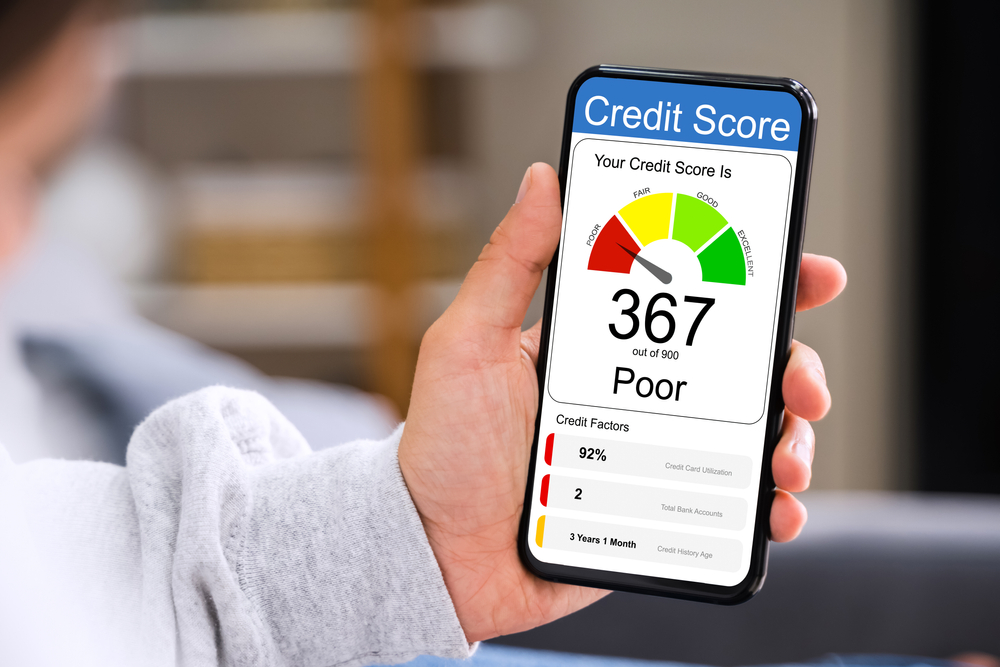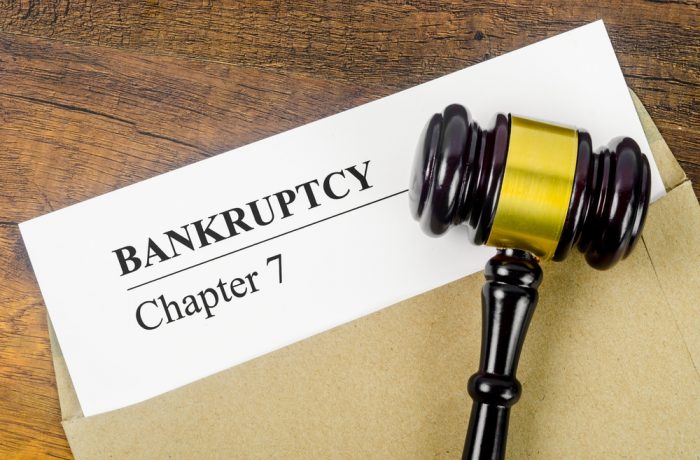Editorial credit: Andrey_Popov / shutterstock.com
There are two primary types of bankruptcy for individuals: Chapter 7 and Chapter 13. Both have different processes and implications for debt discharge, and they affect credit scores differently.
- Chapter 7 Bankruptcy: This involves the liquidation of non-exempt assets to repay creditors. It typically remains on your credit report for 10 years. However, it can help you discharge most unsecured debts (such as credit card debt and medical bills), offering a fresh start more quickly than Chapter 13.
- Chapter 13 Bankruptcy: This involves a repayment plan where you pay back a portion of your debts over three to five years. It stays on your credit report for 7 years and is generally considered less harmful to your credit score because it shows a willingness to repay debts. Read more at www.askthelawyer.us. To read the complete analysis on our bankruptcy blog, click here.
How Bankruptcy Affects Your Credit Score
Filing for bankruptcy can result in an immediate drop in your credit score. The more you had in good standing before bankruptcy, the more significant the drop. On average, a person’s credit score can drop by 100 to 200 points after filing. However, this drop is not as devastating as it seems because most individuals who declare bankruptcy already have poor credit due to missed payments, high debt-to-credit ratios, or defaulted loans.
- Credit Score Recovery Timeline: After bankruptcy, your credit score will gradually improve as you begin to establish positive financial habits. Depending on the type of bankruptcy, a person may start seeing improvements in as little as 12 to 24 months after the discharge of debt.
- Post-Bankruptcy Credit Building: Once your bankruptcy is finalized, your priority should be rebuilding your credit. This can be achieved through secured credit cards, responsibly managing debts, and ensuring that any remaining bills are paid on time.
Will You Be Able to Get Loans After Bankruptcy?
While bankruptcy has a significant impact on your credit score, it does not make it impossible to obtain credit in the future. In fact, many lenders are willing to work with individuals who have filed for bankruptcy, though it comes with certain conditions.
- Loan Availability: It may be difficult to get traditional loans (such as unsecured personal loans or mortgages) in the first two to three years after a bankruptcy filing. However, individuals can explore subprime loans or FHA loans (for home purchases) that are designed for those with lower credit scores or those recovering from bankruptcy.
- Interest Rates: Be prepared to face higher interest rates after bankruptcy, as lenders view you as a higher risk. Over time, as your credit score improves and you demonstrate responsible financial behavior, you can qualify for better terms.
Bankruptcy as a Reasonable Option
It’s easy to view bankruptcy as a financial failure, but this perception overlooks its benefits. Declaring bankruptcy can stop creditor harassment, prevent wage garnishments, halt foreclosure proceedings, and even eliminate unsecured debts. For individuals stuck in a cycle of overwhelming debt, bankruptcy can provide much-needed relief and the opportunity to rebuild.
Financial advisors and bankruptcy lawyers should educate clients on the potential benefits of bankruptcy, especially when there are no feasible options for paying off their debt. Instead of struggling for years under impossible financial conditions, bankruptcy offers a legal solution that can reset a person’s financial health.
Rebuilding Credit After Bankruptcy: Key Steps
Once the bankruptcy process is complete, individuals can begin to rebuild their credit. The journey to financial recovery requires discipline, but it’s achievable with these steps:
- Check Your Credit Reports Regularly
After filing for bankruptcy, it’s crucial to monitor your credit reports from all three major credit bureaus—Equifax, Experian, and TransUnion. Ensure that all debts discharged during bankruptcy are correctly listed. Incorrect information can harm your efforts to rebuild credit.
- Apply for a Secured Credit Card
Secured credit cards are one of the best ways to rebuild credit. These cards require a cash deposit as collateral, but they function like regular credit cards. Timely payments will reflect positively on your credit report and contribute to improving your score.
- Make Payments on Time
Payment history is one of the most significant factors affecting your credit score. Make sure to pay all bills—whether they’re for utilities, car loans, or credit cards—on time. Consistent, timely payments will gradually improve your credit score.
- Keep Credit Balances Low
Keep credit card balances below 30% of your credit limit. High balances can negatively impact your credit utilization ratio, which can slow down your credit recovery process.
- Seek Professional Financial Advice
Bankruptcy lawyers and financial advisors play a critical role in helping individuals navigate post-bankruptcy life. These professionals can provide tailored advice on how to manage finances, build credit, and avoid common pitfalls that lead to debt accumulation.
Final Thoughts: Bankruptcy Isn’t the End of the Road
Bankruptcy is not a dead-end but rather a new beginning. While it will affect your credit score for several years, it does not prevent you from rebuilding your financial life. Many people have successfully recovered from bankruptcy, reestablished their credit, and even secured loans and mortgages within a few years of filing.
If you or a client is considering bankruptcy, it’s important to approach the process with a positive mindset. While it might seem like a difficult step, bankruptcy can be the most responsible and effective way to escape debt and regain financial stability.
By following the steps outlined in this article, individuals can rebuild their credit scores and regain their financial footing after bankruptcy. For bankruptcy lawyers and financial advisors, guiding clients through the process with empathy and clear, practical advice is key to their long-term success.
Key Takeaways:
- Bankruptcy stays on your credit report for 7-10 years but doesn’t permanently prevent you from obtaining credit.
- Expect an initial drop in credit score but potential improvements within 12 to 24 months.
- Rebuilding credit is possible with tools like secured credit cards, timely payments, and low credit utilization.
- Bankruptcy offers a structured way out of overwhelming debt, allowing individuals to start fresh.
Bankruptcy is not the end; it’s a new beginning. Allow yourself to have a fresh start. Contact the Bankruptcy Law Firm of Figeroux & Associates today. Call 855-768-8845 or visit www.askthelawyer.us to book a consultation. The lawyer you hire does make a differe





